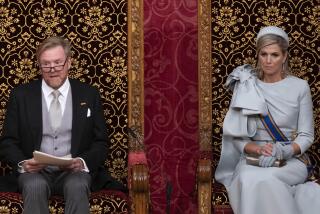Further Shift of State Operations to Private Sector Planned : Thatcher Offers Radical Package of Domestic Reforms
- Share via
LONDON — Margaret Thatcher launched her third term as prime minister before a crowded, boisterous House of Commons on Thursday, promising Britain the most radical package of domestic reforms since Labor erected the welfare state in 1945.
Her government’s program, which pledges further transfer of government-owned industry and government-run services to the private sector, sweeping educational reform and the application of private enterprise to revive inner-city slums, is widely seen as an ambitious extension of the controversial brand of popular capitalism that marked Thatcher’s first eight years in power.
“The wealth of a country is the effort of its people,” she told the house, “and effort depends on incentives.”
She argued that her first two governments had brought record living standards at home and a new confidence in Britain both at home and abroad.
“Britain is now succeeding,” she declared.
Despite her impressive record and the landslide election victory two weeks ago that made her the first British prime minister since the 1820s to win a third consecutive term, Thatcher’s leadership has always been contentious, and the combative mood in the House of Commons on the first day of the session indicated that she would be stiffly opposed in the months ahead.
While Thatcher’s admirers believe she has unleashed a new sense of national energy, her opponents claim it has been at the expense of the disadvantaged. They predicted the program announced Thursday would only give greater advantage to the affluent and successful, dividing Britain more deeply into a nation of haves and have-nots.
“We will fight these proposals tooth and nail,” leader Neil Kinnock of the opposition Labor Party vowed. “This is a government that knows the price of everything, but the value of absolutely nothing.”
Added Liberal member David Alton, “There is no attempt at reconciliation, just full-blooded, unadulterated Thatcherism.”
However, with a comfortable 102-seat majority in the 650-member house, Thatcher’s opponents appear powerless to stop her policies from being implemented.
While Thatcher, as the senior Western leader, also underscored Britain’s commitment to the Atlantic Alliance and support for the Reagan Administration’s arms control proposals, there seems little doubt that the early period of her term will be devoted mainly to her ambitious domestic reforms.
Among them:
-- Accelerating the country’s ambitious program of placing state-run organizations in private hands, including airports, water utilities and public street cleaning.
-- A coordinated effort to revive deprived inner city areas, the scene of serious rioting during Thatcher’s years in office. Thatcher will personally head a task force involving seven government ministries to improve inner city education, housing and development with the aid of private enterprise.
-- Abolishing local property taxes and replacing them with a uniform “community charge,” a de facto poll charge on anyone over the age of 18. The plan is likely to be the most controversial element of her new program.
-- The most fundamental shake-up of basic education since the end of World War II, including a required basic national curriculum and national tests for students at ages 7, 11, 14 and 16.
In many instances, Thatcher’s proposals are aimed at reducing the role of often Labor-dominated local governments, a fact that has raised concern among her opponents of a dangerous centralization of power.
Thatcher views Labor-controlled local governments as a threat to Britain’s social stability.
“The troublemakers have migrated from the trade unions to local government,” a Thatcher aide said. “The attack on the established order in Britain has transferred from the shop floor to local government council chambers.”
Thatcher’s program was unveiled in a formal address to a joint session of Parliament on Thursday morning by Queen Elizabeth II.
In a colorful ritual dating back to medieval England, the queen traveled to Parliament in a horse-drawn state carriage to deliver her speech from a throne in the House of Lords chamber.
During the 20-minute nationally televised address, she was surrounded by peers in ceremonial red robes, elected members of the House of Commons, including Thatcher and her Cabinet, and men with such titles as “Gold Stick in Waiting,” “Gentleman Usher of the Black Rod” and “Field Officer in Brigade Waiting.”
More to Read
Sign up for Essential California
The most important California stories and recommendations in your inbox every morning.
You may occasionally receive promotional content from the Los Angeles Times.













